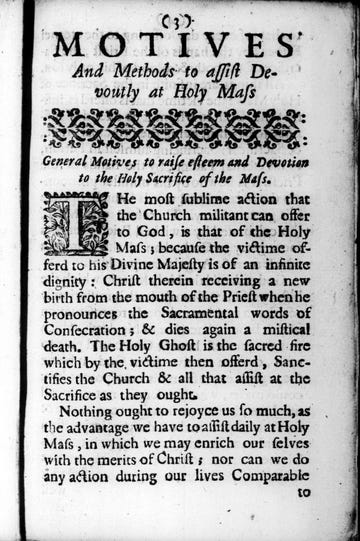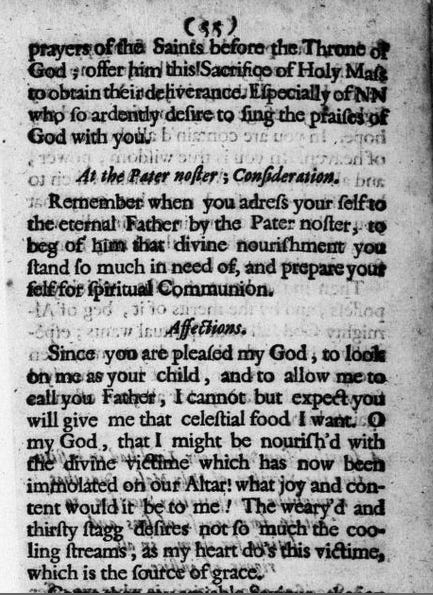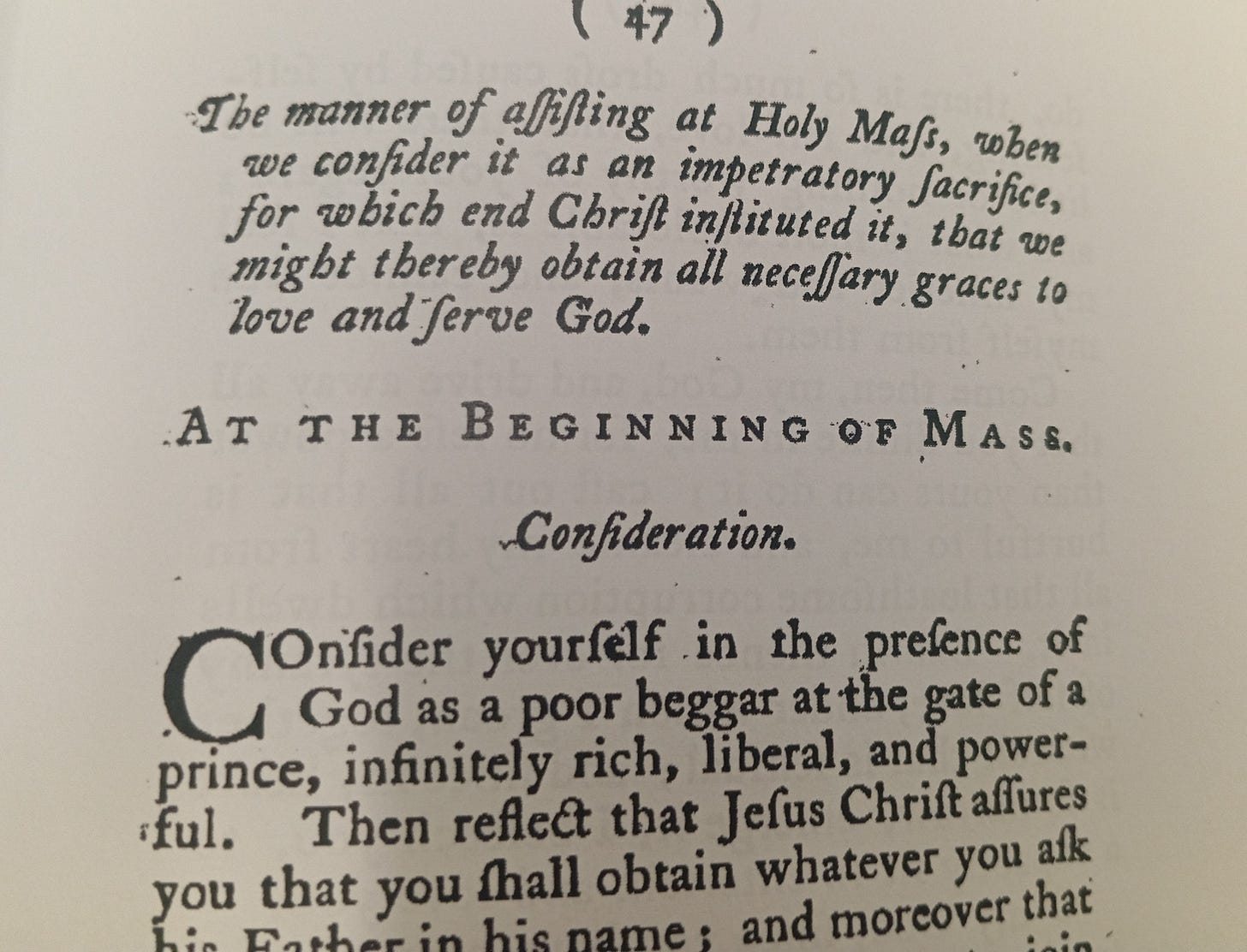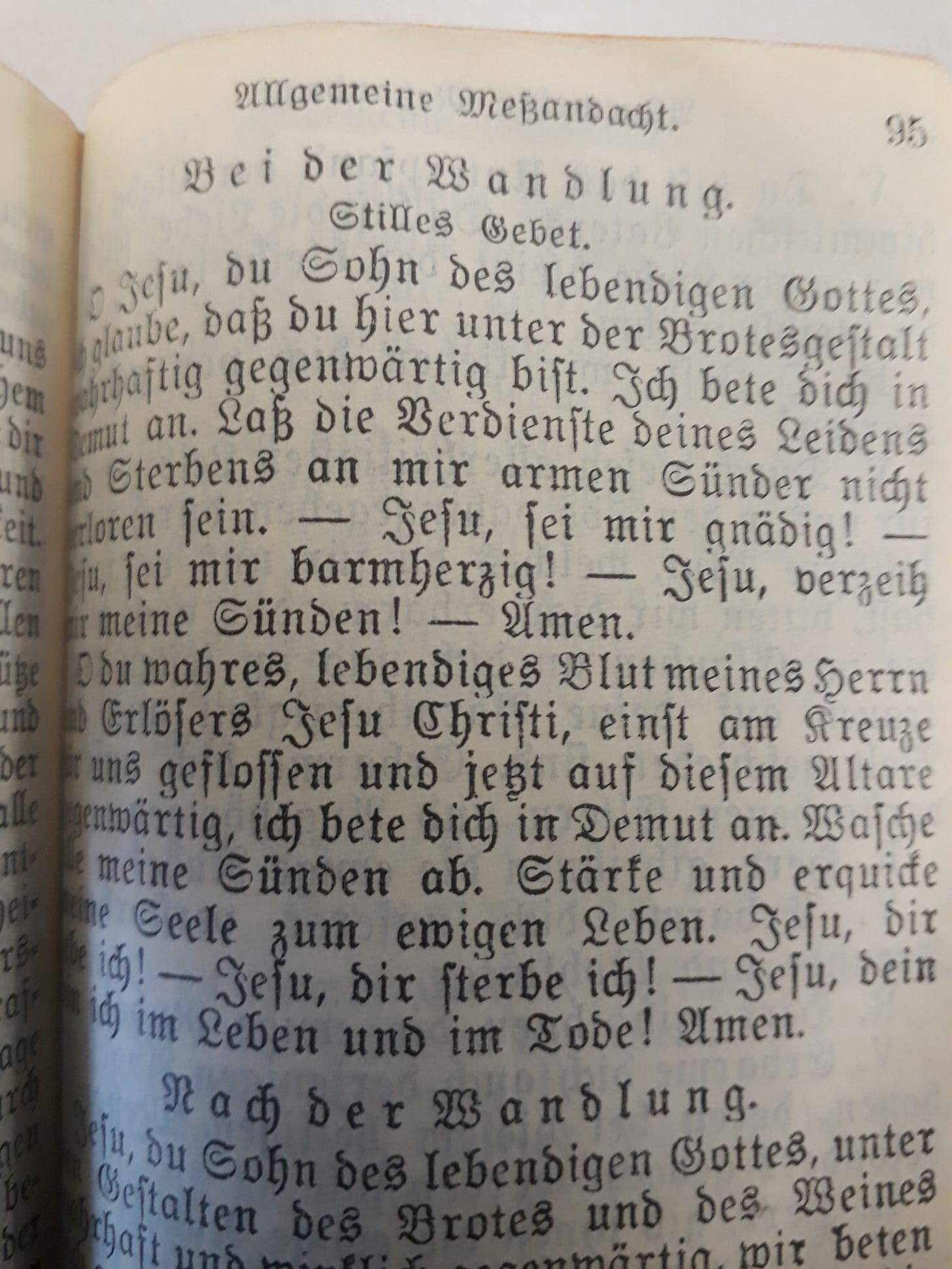Liturgical Renewal & Old Prayerbooks: A Book Rec
Book Recommendation: "Several Excellent Methods of Hearing Mass" by Lady Lucy Herbert
Is it possible to see beyond of the current doctrinal and liturgical malaise in the Roman Catholic Church? I honestly don't think so. All we can do is try, accepting that our share of this sickness is likely greater than we know. The best place to try and get perspective is from history, from a time wholly different than ours. What were they praying, how were they praying, worshipping, doing penance, etc? This post is about a old, forgotten prayerbook I discovered and how it helped me get some perspective.
I have an intuitive bent to my personality, one that´s always searching for basis points from which to make new generalizations. Trying to figure out people, places, circumstances based on what C.S. Peirce called abductive inference: that is, to intuit an explanatory hypothesis based on an observation combined with a known rule. Wandering through the various european countries, I try to figure out the cultures this way. I notice differences and try to infer, based on basic known rules, various explanatory hypotheses.
One example that doesn´t have to do with any specific culture, but transcends all cultures, is that the most hospitable people, or moreover, the people most likely to spontaneously invite a strangely dressed pilgrim into their homes, these people have very, very disorganized homes as a rule. It´s astounding that there are so few exceptions to this rule in my experience on pilgrimmage. So this is the (1) observed case, combine it with the rule that (2) people either with organized homes don´t want the disorder of a spontaneous guest, or some people with disorganized homes are too ashamed to welcome any guest that the mess be seen, one assumes the (3) hypothesis that a certain comfort with disorder, as well as a lack of shame about it, are characteristics of the most hospitable people.
But I often use this method to try to figure out cultures. I notice odd things when I am in a foreign country, and I fixate on them, I mull over them and try to apply known rules to the case, and then make hypothesis about the culture generally. I really enjoy trying to understand this way. When walking through France, for instance, I´ve often been astounded at how much dog poop I see on the sidewalk. It´s shocking. They just leave it there. “How could you just leave it there?” I ask in astonishment. And it´s really unparalleled in Europe in my experience. In Germany or Portugal, for instance, this is simply not to be found. There, the sidewalks are always clean.
But what also amazes me, is that French neighborhoods are often littered with little dispensers on lamp-posts filled with little plastic bags to encourage people to actually clean up after themselves and their canines. It´s funny. You realize that at some point the French town board got together, admitted they had a problem, and then chose an apparently logical remedy to the problem. A solution that suggests convenience is the issue, one that says “if they only had bags delivered to them on the sidewalk, decent French people would want to do the right thing and pick up the poo.” au contraire.
Instead, I suspect the problem is likely cultural and gather evidence for a hypothesis—walking through france, I notice the superabundance of hair salons, even in small villages. I notice the preponderance of gaudy Christmas lights and lawn ornaments. I notice the tendency to litter churches with needless clutter and artifacts on the walls. So there are my cases and I add a rule. People overly soliticious about their hairstyle, who adorn their lawns with silly cardboard Santas and churches with unseemly colored lights and annoying motion-sensored musical mangers, people who desire to frame their clothing and hang it up in their local church for a small fee (you´d have to see it to believe it but you´ll find it´s quite common in parts of France—it looks like framed old underwear!!), such peculiarities could only come from a people who have a tendency toward a vanity that places value in excessive gaudy and superficial ornamentation. So I infer there, as a rule, must be a sort of french tendency toward aesthetic excess, a sort of vanity to the culture that can go awry in the direction of superfical and gaudy ornamentation. It seems to me that Cistercian austerity in architecture is a very reaction against this vain tendency.
So thats my rule and this helps me generate my hypothesis: the problem is that the French are in fact a vain and superficial people, at their worst, seeing this sort of gesture—to bend over and pick up poo—as beneath them, as is my theory, (a good hearted german does this sort of thing with great moral zeal, ha, which is almost equally rediculous but at least the steets are clean). And then the boxes are merely a sign of a total misdiagnosis of the problem. Then one will only have sidewalks with dog poo and unused dispensers with little bags intended to be used for picking up the waste. In any case, thats what one finds.
After seeing these dispensers and the feces on the sidewalk, day after day, in town after town, I realized that the solution to the problem is a symptom of the problem itself. The dispensers are not a movement towards a solution, they are part of the problem, a misdiagnosis. Part of being french isn´t just the toleration of dog poo on the sidewalk—and as a culture they are very hospitable I find, which supports my previous theory— but equally if not more french is being the sort of person that thinks putting up doggy-bag dispensers everywhere would fix the problem. In the Philipines, they´d just remove fingers and the problem goes away. But in life this is more often than not the case, when we try to solve our own deep seeded flaws: Our very attempts to fix our problems are often actually signs or symptoms of the problem itself. A problem we cannot see or recognize.
So I am writing a book recommendation. I´m getting around to it, slowly, don´t worry. So I say all of this as a roundabout prelude, because I fear much of what can be categorized as efforts to renew the liturgy are more easily characterized as symptoms of our liturgical malaise.
Part of being catholic today isn´t just a tolerance of hackneyed liturgical shit on the sidewalk, it´s also having boneheaded ideas about how to get rid of the problem. I don´t consider myself immune. I fantasize about a Philipino solution, a Duerte-type Pope who implements the TLM with an iron fist. Don´t tell me why this would get ugly (it would!!), tell me why it wouldn´t be good. Because I wonder: is my fantasy fueled by aesthetics or by the ethical? Or by the truth?
From making it relevant to making it reverent, both well-meaning impulses in the church can appear like aesthetic band-aids to a much bigger spiritual problem, a problem I would be fool-hardy to try to address, as I´m just as french on this issue as you or anybody else and I´d rather not make a fool of myself by trying to touch it. To me, rennaisance polyphany at a high mass could just be the back side of an aesthetic coin that boasts banjo-playing at novus ordo on the front. The coin is our aesthetic, sensate culture. The frame is still often one of immanence, not trancendence in both cases it seems. I say this because the other transcendentals, truth and goodness, the ones this present age has really no easy cultural access to, seem to play second fiddle, if at all. The TLM is cool these days, but why is it good simpliciter? I’m not sure if we even really know, if we could try to explain it.
Here is one case that supports this hypothesis: We don´t pray at Mass like Catholics did a hundred or two hundred years ago. I think this is important. They knew what Holy Mass was good for. They had phronesis, the practical wisdom of how to do something. They knew how to assist at Mass. We don’t. What convinced me of this? I didn´t travel in time or anything. I just pay attention to the contents of catholic devotional material over the past 300 years. And I only know this because I stumbled upon a curious, truly marvelous case. Shortly after my conversion to the catholic faith, I stumbled accross a lovely and edifying 18th Century prayerbook. It is titled, “Several Excellent Methods of Hearing Mass: With fruit and benefit according to the institution of that Divine Sacrifice and the intention of our Holy Mother the Church, With Motives to induce all Christians, particularly Religious Persons to make use of the same“ by the Right Honorable Lady Lucy Herbert of Powis, Superior of the English Augustine-Nuns.
My only idea of what holy people could be doing at Mass comes from this book. The only thing is that it was written over 200 years ago, and I haven´t seen anything like it published in the past 70 years. Thus you can add the rule, if its not being published, there is no demand, and if there´s no demand, no one, not even religious, not even the super-sspx-trads are exercising themselves at Mass as was common amongst laity over 100 years ago. My hypothesis… drum roll… is that this could have something to do with our liturgical malaise, this poverty of practical knowledge.
Back to the book! Of all the books I´ve ever read, Several Excellent Methods of Hearing Mass is perhaps the most surprising and delightful welcome into the interior of a holy soul. To follow along the book, with its manifold methods and occasions for hearing Mass, is to be welcomed into the interior thoughts, affections, and intentions of a spiritually fecund, imaginative and righteous nun. It´s like a master fisherman teaching you one-on-one how to fish, you never knew fishing could be this fun, this beautiful, this effective. She is telling you exactly what to say and when, what to try to feel, what to desire. And I think we all need our hand held at this point. But it´s a revelation— the mere chance to try to think her thoughts and generate her affections, “oh, so this is what holy people do at Mass, aha!“ It´s a catechism unto itself. This book made me, for instance, really fall in love with low Mass, or silent mass for those who are unaccustomed to the traditional rite of Mass. It helped me discover the Mass as a sort of interior playground. One that is almost more enjoyably climbed-all-over and exercised in silence when you have the chance.
But I, like any lonely, attention-deprived, denizen of our age, couldn´t for the life of me sympathize with a low Mass when I first visited. Silence and a priest mumbling back and forth with the server. No song, its difficult to follow, no community, “this is not what the church needs!” I knew at first glance, “it needs community, vibrancy, vitality.” But I missed the interior core. You read a book like this and then, all of the sudden, you can imagine that there are some holy people at low Mass really getting after it in prayer. These were the people you assumed were mindlessly reciting rosaries without attention before.
When I first converted, I would simply print this book out in booklet form and give this book to my protestant family and friends with whom I wished to share the catholic faith, as the affections and intentions presented in this book are so edifying and righteous, its truly difficult to doubt the reality she is interacting with is real. How can you argue with affections and prayers like these? It lends credence to the reality toward which they were oriented: the great Eucharistic Sacrifice and Mystery of Our Faith. This book is in the public domain and is linked above. It can be found in pdf on google books if you want to print it out. Or purchased on amazon. It is written for the traditional Mass and this becomes obvious as some parts of the new Mass are shortened, making it more difficult to follow in the novus ordo.
Since moving to Germany, I´ve looked at Catholic prayerbooks here from the 18th, 19th, and 20th Centuries. In Germany, the older the edition of the Gotteslob, or Magnificat as it used to be called—the standard edition prayer and song book for the german church that is still used today but is regularly revised—well, the case is that the further you go back in time the more interesting and edifying are the sorts of methods for praying Mass. If their presence is any indication of popular appeal, as is the rule, at least some Catholics of the not-so-distant past enjoyed a far livelier medidation at Mass than contemporary catholics do. Such is my hypothesis. I´ve found various antique books with comparable guides to praying the Mass, I say antique because you dont find his genre at all after the reforms.
Unfortunately, like so much of the beaurocratic verbiage in the church today, where church closings en masse are labeled “renewal” programs and the like, the evidence from prayer books like this one raises the fear in me that the liturgical renewal movement itself— or more specifically the term, active participation from Sacrosanctum Concilium of Vatican II— is a sign and symptom of our liturgical problem. Even that hallowed word, active participation, is like a doggy bag dispenser for me. It’s not being used to clean up the shit. It was never going to. It´s dancing, singing, holding hands, getting physically active, hugging others, forming circles, for many it seems, yes, active participation means this. But worse, it seems based on a lifeless, “passive” past that, in light of my observation, could only be a fiction. Because when I think about, not active participation, but perhaps NFL-level assisting at Mass, with full attention, recollection, meditation and prayer, maximal edification, I can only think of this antiquated book and those like it.
To me, its a telling sign that this genre of book has totally ceased to exist. In the current german Gotteslob, there is not one prescribed meditation on the Mass like one finds in this same book 100 years ago. The picture above is taken from a very small late 19th century prayer book, with prayers at the consecration (i.e. Bei der Wandlung) and after the consecration on the page photographed. It is a prayer book I found for laity, which contains a plethora of various ways to meditate on and pray at Mass, for different intentions and on different occasions, much like the book from Lady Lucy Herbert.
So, one effort I doubt could be so categorized as a symptom of the problem, perhaps this is my folly, is my wish to commend this book to all! Or books like it, perhaps there are many others. That every catholic could for one Mass pray along with a holy english Abbess from a different, likely more pious, time! Or that people would start writing them again, that the genre would return to Catholics. Perhaps that will be a future post, Method of Praying the Mass for Modern Idiots. As I said, I refuse to diagnose our liturgical problem as it’s a near certainty I would embarrass myself, but I also have the suspicion it would be foolhardy.
Wittgenstein has an insightful distinction between a theoretical explaning of something and a practical being reminded of something. He says its almost always a sign of the problem when we try to solve certain practical problems, usually technical, cultural or religious things, through speculative explanation, particularly in order to recover a lost meaning. So, if I gave a theoretical account of the Mass here and defined the essence of true participation perspicuously, something I am not equipped to do, would that even help? Wittgenstein says our seeking to remedy practical, cultural problems by means of better speculative explanation is another one of these french doggy-bag dispenser type cases, where the solution is really a symptom of a bigger, unforseen problem. He says regarding cultural wisdom we simply need to be reminded, that we need to be shown on a practical level. He says we dont need better explanation in these practical cases, but a better example to learn from, a better witness to imitate. And that´s what I think I need and that’s exactly what the book by Lady Lucy Herbert does, it helps us remember what it means to be a Catholic at Mass. It’s learning by doing. Her methods of praying the Mass show us what Holy Mass could be for-e.g. a thanksgiving, a self-offering, etc.
I love the aesthetics of the traditional mass, particularly chant, and the restoration of these things amongst the younger generation as well as the desire for it, is truly wonderful. But I think the real liturgical revival will show ethical fruit. It wont be a matter of taste alone but taste transformed by truth and gooodness. I think the most certain sign that true liturgical renewal has occured, in spirit and in truth— i.e. not just aesthetic fashion—will be seen in the outpouring of the works of mercy, corporal and spiritual, amongst the laity. When we come to realize, not just theoretically but also practically, the graces offered to us at Mass, the mercy given to us there, and how undeserving we are of this mercy as well as how badly we need it, I think we will be compelled to practice that same mercy more and more as we are sent from Mass in the communities where we live. Trad communities are not known for this focus, particularly the corporal works of mercy, and I don´t think it´s a mischaracterization. Novus ordo communities omit certain spiritual works of mercy almost on principle at this point, refusing to correct the sinner or instruct the ignorant.
The meeting of these works of mercy, both corporal and spiritual, is in the work of hospitality. It´s also probably the deepest spiritual need in the west, where most people are without deep friendships and dealing with broken families. And people who are hospitable, I´ve come to realize, are people who are relatively comfortable letting people see their interior disorder and\or aren´t ashamed by it. Hospitable people are the most disordered people of all! Many just need to learn to recognize it in humility. Yet normie catholics don´t even see their inner disorder due to the abuse of mercy and bad catechesis, and trads are often ashamed by, or try to pridefully hide, their knowledge of their inner disorder. I don´t think I merely speak for myself here. Trads do so out of a false reaction against this abuse of mercy, a reaction that focuses on severity and justice, which again is often simply the other side of a false coin. People can accuse me of making a false equivalence here, as the abuses in the Novus Ordo are so great, and the errors of the Trads so miniscule. I agree, I am a trad! But those closer to the truth, are more free. And those who are more free are more responsible. And the faults of those most responsible are weighed differently than the clueless. When trads start coming to Mass taking responsibility for what increasingly looks like an ideologically compromised Church rather than blaming others, they will find the mercy which they´d been lacking is what they desperately need from the Sacrifice on the Altar.
They´ll also see the disorder of their neighbor as their own, and be moved to mercy. Which is maybe the right answer to why disorderly people offer me hospitality so often. Their homes and life are a mess and they know they need help. So when they see a barefoot man in a jute bag eating out of trash cans, they connect in a different way. They see a pitable caricature of their own mess and are moved to help through the common identification.
The aesthetic renewal of the liturgy reminds us of the riches of tradition, but when these aesthetics lead us to Jesus Christ on the Altar, we will recognize our terrible responsibility and guilt, our personal poverty, our own disorder, and desperate need of help. And I only started to guess at one aspect of my own spiritual poverty and ours, after being reminded of it by this forgotten prayer book, "Several Excellent Methods of Hearing Mass" by Lady Lucy Herbert, which I commend to you heartily.











You write so well. I wonder why did you pick Germany as your base home, no that I know where are you from. I am being in Germany many times and masses are a mess, I would have said, a joke but I want to be kind because the time of the year. The rest of the time I am my awful as usual just fine. You touched and you are right about the french, I should know, my grandparents are french that came after the war to Argentina, yes, the land of the Bergoglio, yes, we know him well, so we understand him but what we don't understand still how he was elected pope or why, we have our theories of course. From a person that belongs to centuries of catholicism (two priests and one venerable at least in my family that I know of) I need to tell you some things. But before I have to tell you that you got to closer conclusions without my help and I think you have insight enough to grasp the essence of the Truth (being the word and the way to our Creator). What do you see in Vatican city it is an illusion, it has nothing to do with faith but politics. They are all impostors because they represent a faith they do not believe in, simple like that. Bishop Malachi Martin have very accurate insights about the situation in the Vatican (Institutional). To do the story short all supernatural aspects of the Faith have been erased and the Novus ordo mass (the mass of the new order as we call it no so jokingly) reflects this ecumenical aspect. For many years in the States I found out that the N.O mass is like a Protestant service , our mass has been deprived of what really is, a sacrifice , Calvary and a means for absolution of our sins. The ethos of catholicism is the tax collector ethos not the pharisee ethos, we go to mass to leave our sins at the altar and looking for the Mercy of God, we do not go to mass to make any community gathering and congratulate each other of our self rightness.
The Church of God at the moment has one Leader, our Lord because His Vicar is lacking (I don't know if yu know that Bergoglio renounces to the title of Vicar of Christ) anyway, who I am to judge (but for their fruits you will know them).
I am so happy that you became a disciple of our lord, of the way, the truth and the live because he became man to brings us life and we have all the knowledge of ages and the most you study the most you fall in love for the richness of this personal relationship with Jesus Christ and His Church. We are His family! I will check out the book you mentioned because I also focus in old books because they are more mysterious and wonderful. I love Hildegard and Teresa de Avila and all the mystics. I study catholics books spiritual battles and the enemy of creation and mainly the human race as active spirits that are active in the world in the more high position of power, human sacrifices and all that. We have for all the tastes in our knowledge of the world accordingly how catholics see the world. My book Altum, Duc in is in Amazon but in Spanish, but it is about finding God in a nihilistic world. And I finish the book with a vision of Maria Valtorta, a mystic where she sees Jesus talking with Peter and telling him that (among other things) the Earth is an altar that should have been to hymns to God but became an Altar of atonement because of the sins of humanity so through life in this realm we make atonement for that we need to repent and love and when love ends in this planet, the earth will ceased to exist. It is one of the more reasonable and beautiful thing I never read. We must love to exist!
Another thing that the catholics have forgotten (not our fault, we haven't have a real cathecism and a real understanding where we come from, neither teaching of the supernatural powers as healing (a sign of a Christian who is in state of grace), bilocation, levitation, etc, so another thing catholics do not "remember' is the creation of a New Earth. All we know would be "destroyed" and Jesus (God) would create a perfect Earth for the fidelis ones, the ones that persevere in the way to salvation. So for the millenians that believe in an Utopian (diabolical mockery) system on Earth I am sorry for them, that would never happen in this realm, we are just passing by. You did the best decision in becoming a catholic and i guess you had a Grace from God because WHO SEEKS FIND, WHO ASKS RECEIVED AND WHO KNOCKS THE DOOR WILL BE OPEN FOR YOU.
Have a very inspiring Holy Week and let's rejoice one more in Jesus defeating death. Vini, Vidi, Vinci. Glory to God that is in the highest and to the men of good will on Earth. !!
I enjoyed the roundabout prelude! Would read more cultural observations.
Also enjoyed the rest:
- "It helped me discover the Mass as a sort of interior playground" - I've tried to do this "by accident" when I find myself distracted at Mass. Love when it happens, often a small Mass or a really long Mass. Perhaps being led into some of these methods
- "The meeting of these works of mercy, both corporal and spiritual, is in the work of hospitality. It´s also probably the deepest spiritual need in the west, where most people are without deep friendships and dealing with broken families." Yes
Thanks!